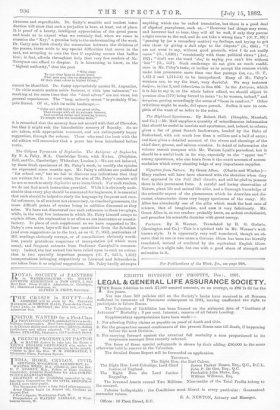A Key to Tennyson's "In Memoriam." By Alfred Getty, D.D.
(David Bogue.)—It is possible that the reader may have a prejudice against keys and commentaries, and the like ; they are, indeed, often
tiresome and unprofitable. Dr. Gatty's sensible and modest intro- duction will show that such a prejudice is here, at least, oat of place. It is proof of a hearty, intelligent appreciation of the great poem, and leads us to expect what we certainly find, when we come to examine the " Key," a genuine help to the understanding of the work. Dr. Gutty sets forth clearly the connection between the divisions of the poems, turns aside to any special difficulties that occur in the text, not scrupling to own the fact if anything occurs that baffles him ; in fact, affords throughout help that very few readers of Mr. Tennyson can afford to despise. It is interesting to know, on the "highest authority," that the poet
" Who sings To one clear harp in divers tones That men may rise on stepping-stones Of their dead selves to higher things,"
cannot be identified. Dr. Getty appropriately quotes St. Augustine, "De vitiis nostril soalam noble facimus, si vitia ipso calcamus," re- marking at the same time that the "dead selves" are not vices, but general experiences. The "long, unlovely street" is probably Wim- pole Street. Of xi., with its noble landscape,— "Calm and still light on you great plain,
That sweeps with all its autumn bowers, And crowded farms and lessening towers, To mingle with the bounding main,"
it is remarked that the scenery does not accord with that of Clevedon, but that it might snit the Lincolnshire scenery of Sorosby. So we are taken, with appropriate comment, and not unfrequently happy suggestion, through the volume. Those who read the book with the old edition will remember that a poem has been introduced before xxxix.



































 Previous page
Previous page